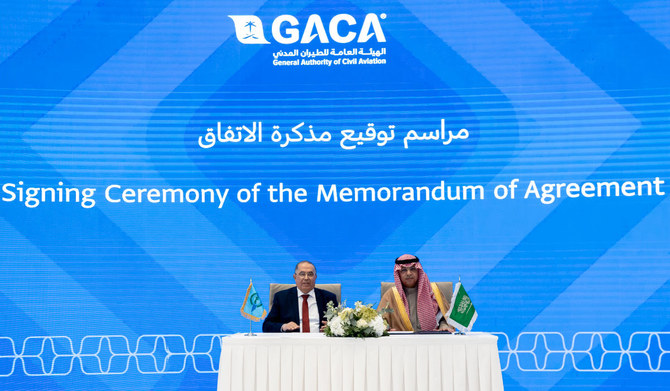RIYADH: A new body to monitor aviation safety in the Middle East and North Africa region was on Wednesday unveiled at an international industry conference being held in Riyadh.
Abdulaziz Al-Duailj, president of the Saudi General Civil Aviation Authority, inaugurated the new MENA Regional Safety Oversight Organization — which will be based in Riyadh — during a ceremony as part of the 15th International Civil Aviation Organization meeting.
A memorandum of agreement was later signed by representatives of MENA-RSOO member states including Saudi Arabia, Djibouti, Sudan, Somalia, Palestine, Libya, Mauritania, and Yemen.

Inauguration ceremony of the Regional Safety Oversight Organization for the Middle East and North African States (MENA-RSOO) which is hosted by Riyadh (Wednesday, December 6, 2023) by Abdulaziz Al Duailej President of the General Civil Aviation Authority inaugurated. (Supplied)
The new organization will aim to help develop and implement national training and safety programs, improve the monitoring of air safety, and work with nations to meet aviation safety standards.
In a speech, Al-Duailj said: “The establishment of the new organization will be a milestone for all its member states and is also a testimony to their commitment to aviation safety, quality, and efficiency.
“This step confirms the Kingdom’s keenness and commitment to aviation safety through its continued cooperation with international partners, to ensure the highest standards of air safety are achieved,” he added.
Al-Duailj noted that the ICAO wanted to see unified safety standards and the integration of technology throughout the civil aviation industry, especially regarding the design of aircraft engines, autonomous control, remotely piloted service aircraft, personal transportation via air taxis, and the overall performance of the air traffic network.
On Saudi Arabia’s financial contribution toward the setting up of the MENA-RSOO, he said: “Through this, the Kingdom aims to activate the role of this organization and support it with an amount of $1.5 million for the first two years of its establishment, in order for the organization to carry out its tasks and responsibilities in supporting air safety programs in our region.
“It also aims to assist member states in strengthening and raising the legislative and supervisory capabilities of their national air safety systems, enabling them to achieve higher levels of compliance with international rules and recommendations,” Al-Duailj added.
Salvatore Sciacchitano, president of the ICAO Council, said that the organization’s inauguration was an important step toward enhancing safety in the civil aviation sector.
“It embodies the amount of cooperation exerted to develop civil aviation safety in the Middle East,” he added.
He pointed out that the sector was an essential driver of economic growth and connectivity between countries.
Abdenbi Manar, director general of the Arab Civil Aviation Organization, noted that the transportation sector played an essential role in the progress of nations.
He said: “It contributes to creating wealth and job opportunities, whether at the industrial level or the infrastructure of the transportation system, and air transport is usually an integral part of this system.
“The air transport sector is distinguished from other types of transportation by its speed, efficiency, regularity, and high level of safety.
“Also, it relies on international standards, whether at the institutional level or at the legal, financial, and technical level,” Manar added.
The five-day ICAO conference is being hosted by the GACA until Dec. 7, with the participation of more than 100 countries and international organizations, and at least 700 industry experts.




























